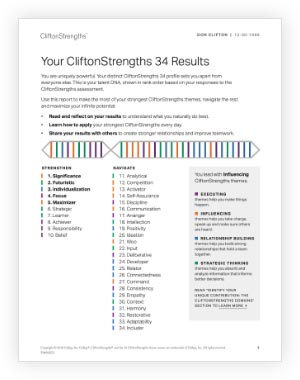Story Highlights
- What sets you apart is your key to sales success
- The four domains describe your areas of excellence
- Know the value proposition of your product and yourself
You did something extraordinary lately. Somewhere in the sales process you engineered, convinced, connected or accomplished things no one else could. And you may not even realize how remarkable it was.
That's not unusual. Your most exceptional abilities are such an intrinsic part of you, you may think anyone can do what you do. But the innate patterns of thought, feeling and behavior that Gallup calls CliftonStrengths -- categorized by four domains: Executing, Influencing, Relationship Building, and Strategic Thinking -- are the lens through which you see the world, the basis of your expectations, and the source of your excellence.
If you could see how different you are -- if sales had game film -- you would see the unique talent you bring. In a way, those domains are your game film: they explain how you operate when you're at your best and when you need an assist.
Your strengths differentiate you. In fact, the odds that you share the same CliftonStrengths in the same order as someone else are one in 33 million.
That differentiation is crucial to succeeding in sales.
And you can leverage that difference by understanding your strengths within the four domains.
Your Talents Show Up in Your Role: Here's How
The four domains define how you show up in the world -- your brand, your contribution, and your unique value. They explain what's behind the action captured in your game film. To get the most out of it, ask yourself:
- How do I build relationships with customers?
- How do I influence my audience to buy?
- How do I think strategically to advance the sale?
- How do I get things done to execute for the customer?
Maybe you build relationships by creating trust or through a genuine connection. Perhaps you influence others by taking charge of the agenda or by developing advocates. Strategic thinking might show up as a drive to learn about a customer's history or visualize their future. You might get things done through organizing a client's chaos or by fixing what went wrong or through sheer determination to upend the status quo. Everybody pulls the levers of their strengths in their own way.
In a way, those domains are your game film: they explain how you operate when you're at your best and when you need an assist.
Whatever your answers may be, they demonstrate that you don't sell like anyone else. And if you tried, you wouldn't get the same results. You succeed in sales your way.
That said, sometimes you have to apply your way differently to succeed.
Managing Weaknesses in Sales Means Depending on Others
No one is great at every part of the sales process, and everyone has weaknesses to manage. The purpose of game film, after all, is to spot actions to repeat and shots that can be improved. Some salespeople can't stay focused on the close, some get bored learning product specs, and some pay way too much attention to prospects' purchase potential and not enough to their actual problems.
Unfortunately, the things you're not great at may be necessary for the sale.
If you know who you are and who you aren't, you can position your strengths in ways you hadn't thought about and better navigate the areas that need managing.
Take, for instance, a sales rep who loses sight of the close. She can leverage her relationship with her manager to align her actions toward the goal better. Salespeople who dislike memorizing product specs need relatable, enthusiastic teachers. The salesperson who is over-focused on the buy can regulate himself by asking probing questions and conducting deeper inquiries.
If you know who you are and who you aren't, you can position your strengths in ways you hadn't thought about and better navigate the areas you have to manage.
That's the key to leveraging strengths: own where you offer something powerful and unique and manage around your weak points. By articulating what makes you different, you'll know where to put your energy: where you're at your best.
Know Your "Value Proposition"
That energy is fueled by your CliftonStrengths. They propel you, engage you, exhilarate you -- which brings out the best in your work. The best salespeople invest in their strengths because what makes you special, makes you valuable. Differentiation isn't just your product's value proposition. It's yours, too.
So review your game film. What were you doing, thinking and feeling when you made the customer sit up and lean in?
Then trace those moments back to the four domains. Did you differentiate by engineering, convincing, connecting or accomplishing something great in the sales process? How could you apply those talents more often? How can you use them in the more challenging parts of your role? How can you grow in those areas?
What did your game film highlight that was extraordinary -- and how can you amplify your value proposition?
Learn more about CliftonStrengths in sales:
- Subscribe to the CliftonStrengths Insights newsletter for monthly insights, updates, content and more.
- Check out our new CliftonStrengths for Sales report.
Gallup®, CliftonStrengths® and each of the 34 CliftonStrengths theme names are trademarks of Gallup. Copyright © 2000 Gallup, Inc. All rights reserved.





